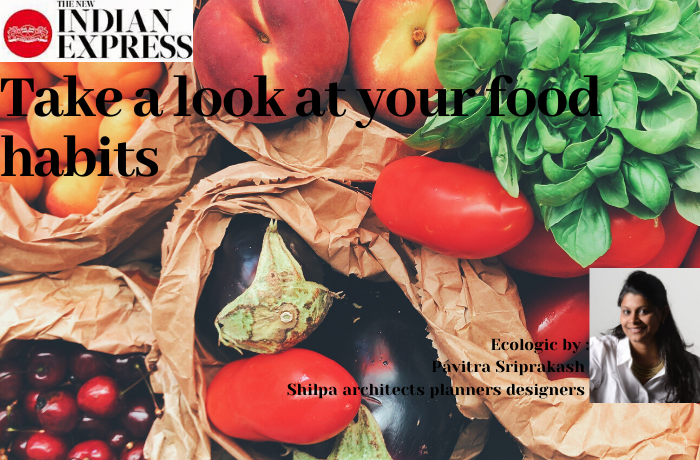11-May-2020 : Pavitra Sriprakash, Director and Chief Designer at Shilpa Architects Planners Designers writes a weekly column on Sustainability for The New Indian Express titled “ECOLOGIC”. This week’s article talks about learning from Covid times- how to reduce food waste at home.
Full article below: (Also available at The New Indian Express Website)
Take a look at your food habits
As the scare of coronavirus in the vegetable markets of Chennai rise, the city is bracing to suffer without the supply of fresh produce. There could be a crisis in availability of vegetables in the city and the shortfall could result in a spurt in prices. This is a good time for us to re-visit our food consumption. Most of us don’t realise how much food waste we produce until we start taking note of it. With more time at home, lockdown can be a time to observe our food waste habits and make some changes to waste less and save more.
Globally, food waste is a major sustainability problem. About 50 per cent of all food across the world is wasted and never reaches the needy. We are proud of our inherently frugal culture, many Indians believe that we don’t waste anything — but the facts show otherwise. India wastes as much food as the whole of United Kingdom consumes. Food wastage is an alarming issue in India. Our streets, garbage bins and landfills have sufficient proof to prove it. According to the United Nations Development Programme, up to 40 per cent of the food produced in India is wasted and about 21 million tonnes of wheat are wasted annually.
The reason that we waste food in our homes is due to poor planning: we buy and cook too much food, we don’t eat our leftovers, and we forget about the food in our pantry, fridge and freezer. Here are some tips to help minimise that waste going forward. Look at what you are throwing away. Keep prepared/ready-to-eat food waste in a separate compostable bin and make a note of what gets put in the bin most often. Don’t overbuy. By only purchasing what you need, less food will go to waste. This is particularly important during lockdown, when there is a strong temptation to overstock on food. Keep track of what you have at home by taking a ‘shelfie’ — a photo of your fridge and cupboards to remind you of what you have! Plan meals and think about what you want to make in advance for a week at a time, so that you only purchase what you need. This will also ensure you use up everything you have.
Eat all the edible parts of your produce. Many of us throw away peels, leaves and stalks that are not only edible, but are the most nutrient-dense part of the fruit or vegetable. Next time you are cooking, consider leaving the peel on your veggies on and cooking the stems, or using the scraps to make stock. Store your food correctly. Storing your food in the right way and in the right place will make it last longer. For example, we should keep bread in the freezer, as our hot and humid climate means that mold grows quickly. Keep a compost bin. If you don’t already compost, consider setting one up after lockdown to ensure that your food waste isn’t ending up in the landfill. Amazon sells Bokashi Buckets, which are great for those who don’t have a lot of space. Stay safe, eat well and conserve food.



